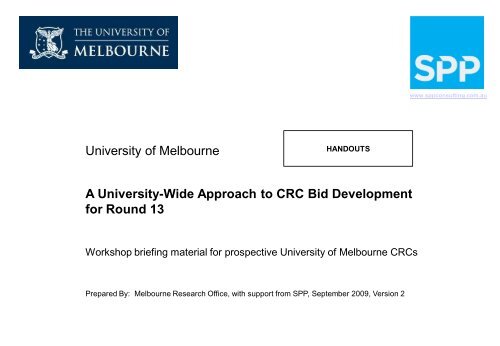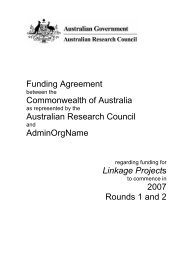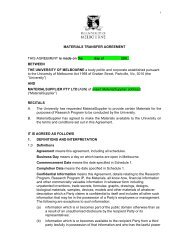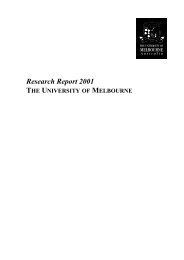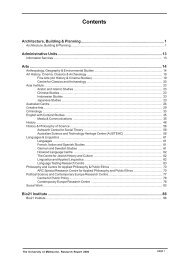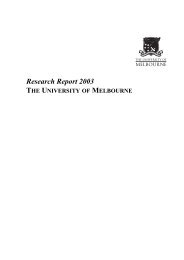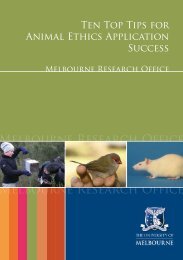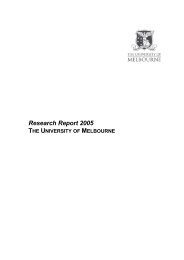University of Melbourne A University-Wide Approach to CRC Bid ...
University of Melbourne A University-Wide Approach to CRC Bid ...
University of Melbourne A University-Wide Approach to CRC Bid ...
Create successful ePaper yourself
Turn your PDF publications into a flip-book with our unique Google optimized e-Paper software.
www.sppconsulting.com.au<br />
<strong>University</strong> <strong>of</strong> <strong>Melbourne</strong><br />
HANDOUTS<br />
A <strong>University</strong>-<strong>Wide</strong> <strong>Approach</strong> <strong>to</strong> <strong>CRC</strong> <strong>Bid</strong> Development<br />
for Round 13<br />
Workshop briefing material for prospective <strong>University</strong> <strong>of</strong> <strong>Melbourne</strong> <strong>CRC</strong>s<br />
Prepared By: <strong>Melbourne</strong> Research Office, with support from SPP, September 2009, Version 2
Background<br />
The <strong>University</strong> <strong>of</strong> <strong>Melbourne</strong> proposes a new approach for the oversight and coordination <strong>of</strong> the<br />
<strong>University</strong>’s involvement in the Cooperative Research Centre (<strong>CRC</strong>) program. The approach is being<br />
implemented by the <strong>Melbourne</strong> Research Office, with support from Strategic Project Partners.<br />
The approach is designed <strong>to</strong> provide a multi-stage education and support program for <strong>CRC</strong> bid<br />
development for <strong>University</strong> led <strong>CRC</strong>s, and a series <strong>of</strong> go / no-go gates that provide for the selection and<br />
endorsement <strong>of</strong> <strong>CRC</strong> bids <strong>to</strong> proceed <strong>to</strong> the next stage <strong>of</strong> development.<br />
A workshop was conducted on Wednesday, 30 th September, <strong>to</strong> brief potential <strong>CRC</strong>s on the new approach.<br />
This presentation is intended <strong>to</strong> provide <strong>CRC</strong>s with an overview <strong>of</strong> the <strong>Melbourne</strong> approach, and an outline<br />
<strong>of</strong> the processes that the <strong>University</strong> expects bid teams <strong>to</strong> conduct in order <strong>to</strong> present a strong, compelling<br />
bid in Round 13, expected in August 2010.<br />
UOM-007 <strong>CRC</strong> Workshop for <strong>University</strong> <strong>of</strong> <strong>Melbourne</strong> Prospective <strong>CRC</strong>s - Handouts Page 1<br />
Strictly private and confidential
<strong>CRC</strong> bid preparation involves five key components <strong>of</strong> activity<br />
Understanding the core components required <strong>to</strong> develop a successful bid is critical.<br />
RECOMMENDED PROCESS FOR <strong>CRC</strong> BID PREPARATION:<br />
Process<br />
step<br />
Preparation<br />
Business<br />
Planning<br />
Partner<br />
Development<br />
Program<br />
Development<br />
<strong>Bid</strong> template and<br />
impact template<br />
preparation<br />
Key<br />
activities<br />
• Understand what’s required in<br />
developing a bid<br />
• Engage internal stakeholders<br />
(CEO, Board, researchers,<br />
support staff)<br />
• Determine if you’re going <strong>to</strong><br />
need help<br />
• Get support on the areas that<br />
you know will require it<br />
• Identify issues <strong>to</strong> solve<br />
• Understand internal<br />
capabilities<br />
• Start “<strong>to</strong>p down” with research<br />
– programs, not projects<br />
• Identify industry partners<br />
• Prepare communications piece<br />
(and business plan if possible)<br />
• Prioritise industry partners<br />
• Develop a communications<br />
piece for potential partners <strong>to</strong><br />
understand the vision<br />
• Understand their needs, and<br />
how they might fit in<br />
• It’s a sell – make no mistake<br />
about it!<br />
• Secure commitment early<br />
• Workshop research projects<br />
within each program<br />
• Use a framework <strong>to</strong> narrow<br />
the focus, and eliminate those<br />
projects that are not critical <strong>to</strong><br />
the bid<br />
• Identify resources required<br />
(researchers, materials,<br />
infrastructure etc)<br />
• Develop costings,<br />
contributions and governance<br />
• Estimate and quantify benefits<br />
– logic over estimation is key<br />
• Delegate tasks effectively,<br />
populate the template, review<br />
drafts regularly<br />
• Ensure bid leader and key<br />
researchers are engaged<br />
Overall:<br />
• Line your ducks up!<br />
• Articulate your vision, “<strong>to</strong>p<br />
down” and in layman’s<br />
terms<br />
• Secure commitment from<br />
research and end-user<br />
partners<br />
• Get in<strong>to</strong> the detail<br />
• Write the submission<br />
There is a significant amount <strong>of</strong> work <strong>to</strong> be done<br />
before the bid template can be filled<br />
Source: SPP, March 2009.<br />
UOM-007 <strong>CRC</strong> Workshop for <strong>University</strong> <strong>of</strong> <strong>Melbourne</strong> Prospective <strong>CRC</strong>s - Handouts Page 2<br />
Strictly private and confidential
The <strong>University</strong> <strong>of</strong> <strong>Melbourne</strong> has defined a new model for <strong>CRC</strong> development<br />
The <strong>Melbourne</strong> Research Office has provided a framework for a new model for <strong>CRC</strong> development. The guiding principles are<br />
identified below.<br />
GUIDING PRINCIPLES FOR THE UNIVERSITY OF MELBOURNE’S STRATEGIC APPROACH TO <strong>CRC</strong><br />
DEVELOPMENT:<br />
• Early knowledge by Faculties / <strong>Melbourne</strong> Research Office <strong>of</strong> intended <strong>CRC</strong>s<br />
• Opportunity for operational and strategic feedback at an early stage<br />
• Early go/no-go decision making in relation <strong>to</strong> the <strong>University</strong>’s involvement in specific <strong>CRC</strong>s<br />
• High degree <strong>of</strong> comfort across the <strong>University</strong> that the <strong>CRC</strong>s the <strong>University</strong> is involved in are the right ones<br />
• <strong>University</strong> pr<strong>of</strong>essional staff from <strong>Melbourne</strong> Research, <strong>Melbourne</strong> Ventures, Legal Office and Faculties will be engaged<br />
in the process throughout<br />
• The model will serve as a valuable pr<strong>of</strong>essional training opportunity (a train the trainer approach)<br />
The model has two parts:<br />
Part One:<br />
Part Two:<br />
A multi-stage education and support program for <strong>CRC</strong> bid development for <strong>University</strong>-led <strong>CRC</strong>s<br />
A series <strong>of</strong> go/no-go gates that provide for the selection and endorsement <strong>of</strong> <strong>CRC</strong> bids <strong>to</strong><br />
proceed <strong>to</strong> the next stage<br />
The <strong>University</strong>’s approach <strong>to</strong> <strong>CRC</strong>s is intended <strong>to</strong> develop and strengthen potential<br />
bids proposals in order <strong>to</strong> achieve a higher success rate in Round 13<br />
Source: SPP work with <strong>Melbourne</strong> Research Office, August / September 2009.<br />
UOM-007 <strong>CRC</strong> Workshop for <strong>University</strong> <strong>of</strong> <strong>Melbourne</strong> Prospective <strong>CRC</strong>s - Handouts Page 3<br />
Strictly private and confidential
The model delivers compelling bids in time for the next round<br />
The timing required by the <strong>CRC</strong> committee and the <strong>University</strong> is well unders<strong>to</strong>od. The program needs <strong>to</strong> work in with other<br />
funding timing such as ARC, NH&MRC and other applications.<br />
Stage 1 Stage 2 Stage 3 Stage 4 Stage 5<br />
<strong>CRC</strong><br />
Briefing /<br />
Workshop<br />
on early<br />
bid<br />
preparation<br />
EOI<br />
<strong>Bid</strong> Coaching,<br />
development and<br />
support<br />
Work with EOIs <strong>to</strong><br />
develop key elements:<br />
• Issues solved<br />
• Program position<br />
• Potential partners /<br />
collabora<strong>to</strong>rs<br />
• Prepare internal<br />
presentation<br />
Present <strong>to</strong><br />
<strong>University</strong><br />
Panel<br />
including<br />
host<br />
faculty<br />
Decision<br />
made as <strong>to</strong><br />
whether <strong>to</strong><br />
proceed<br />
with bid,<br />
advice on<br />
key issues<br />
More detailed bid<br />
development<br />
Mini-business<br />
planning, operational<br />
management<br />
considerations,<br />
governance<br />
framework, alignment<br />
<strong>of</strong> research with enduser<br />
needs,<br />
engagement with<br />
partners<br />
Present <strong>to</strong><br />
<strong>University</strong><br />
panel<br />
GO / NO-<br />
GO<br />
decision<br />
Final stage <strong>of</strong> bid<br />
development<br />
Detailed business<br />
plan, preparation <strong>of</strong> all<br />
material required <strong>to</strong><br />
submit the bid<br />
including impact<br />
analysis, engagement<br />
with partners etc<br />
Final<br />
presentation<br />
and<br />
submission<br />
for<br />
<strong>University</strong><br />
sign<strong>of</strong>f<br />
Date: 9/10/09 w/c 26/10/09<br />
Early March 2010 July 2010<br />
The first and second gates will be completed by end-Oc<strong>to</strong>ber 2009<br />
Source: SPP work with <strong>Melbourne</strong> Research Office, August / September 2009.<br />
UOM-007 <strong>CRC</strong> Workshop for <strong>University</strong> <strong>of</strong> <strong>Melbourne</strong> Prospective <strong>CRC</strong>s - Handouts Page 4<br />
Strictly private and confidential
Each stage has specific objectives<br />
The key objectives <strong>of</strong> each stage are summarised below.<br />
Stage 1: BRIEFING AND INFORMATIONAL, EOI<br />
• Make bid leaders aware <strong>of</strong> the amount <strong>of</strong> work required <strong>to</strong> develop the bid<br />
• Brief bid leaders on the critical success fac<strong>to</strong>rs in developing a successful bid (not just about the research!)<br />
• Identify potential issues and stumbling blocks, and steps <strong>to</strong> resolve<br />
Stage 2: BID COACHING, DEVELOPMENT OF THE CASE<br />
• Provide bid teams with frameworks <strong>to</strong> capture key information on the bid<br />
• Lead the teams through development <strong>of</strong> the information and analysis<br />
• Help teams identify the issues / opportunities their <strong>CRC</strong> will solve, the research they will do <strong>to</strong> solve the issues, and the<br />
process by which their research will be deployed by end-users <strong>to</strong> deliver a benefit<br />
• Provide additional support / specific facilitation on an individual basis if required<br />
• Provide ongoing coaching, feedback and support <strong>to</strong> teams<br />
Stage 3: PRELIMINARY BUSINESS PLANNING<br />
• Develop preliminary business plans including answering the “why, what and how” – the value <strong>CRC</strong> proposition, research<br />
partner engagement, research leaders, market and competi<strong>to</strong>r analysis, and other items<br />
Stage 4: DETAILED BUSINESS PLANNING AND BID PREPARATION<br />
• Development <strong>of</strong> a full business plan (if required / requested by Faculties)<br />
• Writing <strong>of</strong> the <strong>CRC</strong> application and associated documents (Impact Tool, Budget, others)<br />
The objectives for each stage are clear. The bid leader needs <strong>to</strong> plan<br />
early <strong>to</strong> meet these objectives<br />
Source: SPP work with <strong>Melbourne</strong> Research Office, August / September 2009.<br />
UOM-007 <strong>CRC</strong> Workshop for <strong>University</strong> <strong>of</strong> <strong>Melbourne</strong> Prospective <strong>CRC</strong>s - Handouts Page 5<br />
Strictly private and confidential
<strong>CRC</strong> bids will be evaluated at each “gate”<br />
The objective <strong>of</strong> each “gate” gives bid leaders a better idea on how they will be evaluated at each stage <strong>of</strong> the internal<br />
process.<br />
OBJECTIVES:<br />
Gate 1<br />
EOI<br />
Gate 2<br />
<strong>Bid</strong> coaching, development and<br />
support<br />
Gate 3<br />
More detailed bid development<br />
• Expression <strong>of</strong> Interest<br />
• Must have Head and Faculty sign-<strong>of</strong>f<br />
• <strong>University</strong> involvement in non-lead bids<br />
will also be required <strong>to</strong> submit EOIs<br />
• All potential bids will be supported <strong>to</strong> the<br />
next stage, unless high numbers <strong>of</strong><br />
EOIs are received<br />
• Presentation <strong>to</strong> <strong>University</strong> Panel<br />
• Assess whether the proposed <strong>CRC</strong> bid is<br />
good enough <strong>to</strong> progress <strong>to</strong> the next<br />
stage<br />
• Provide feedback on strengths and<br />
weaknesses<br />
• Approximately 6 bids will proceed <strong>to</strong><br />
“Gate 3”<br />
• Second Presentation <strong>to</strong> <strong>University</strong><br />
Panel<br />
• Identify and endorse the proposed<br />
<strong>CRC</strong> bids that will go forward in<strong>to</strong> full<br />
bid development<br />
• Gain Faculties’ full support <strong>of</strong> the <strong>CRC</strong><br />
bid going forward (require formal sign<strong>of</strong>f)<br />
• Provide feedback on strengths and<br />
weaknesses<br />
9 th Oc<strong>to</strong>ber<br />
w/c 26 th Oc<strong>to</strong>ber<br />
(times <strong>to</strong> be scheduled)<br />
March 2010<br />
Each “gate” is designed <strong>to</strong> track the progress and assess the<br />
strength <strong>of</strong> the <strong>CRC</strong> bids going forward<br />
Source: <strong>Melbourne</strong> Research Office, August / September 2009.<br />
UOM-007 <strong>CRC</strong> Workshop for <strong>University</strong> <strong>of</strong> <strong>Melbourne</strong> Prospective <strong>CRC</strong>s - Handouts Page 6<br />
Strictly private and confidential
The EOI is required at MRO by Oc<strong>to</strong>ber 9 th<br />
There are specific questions in the EOI that must be answered. All proposed projects will proceed unless there are unusually<br />
large numbers <strong>of</strong> applications. Responses <strong>to</strong> each question should be no longer than 5 lines and must be endorsed by the<br />
Head <strong>of</strong> Department, Associate Dean and Dean <strong>of</strong> the relevant faculties.<br />
QUESTIONS TO ADDRESS:<br />
Is this a public good or<br />
commercially oriented <strong>CRC</strong><br />
What is the key concept/ rationale <strong>of</strong><br />
the <strong>CRC</strong><br />
Who are the likely researcher and<br />
end-user partners that you seek <strong>to</strong><br />
involve (i.e. what industry sec<strong>to</strong>r,<br />
potential collabora<strong>to</strong>rs)<br />
Once EOIs are submitted Teams may<br />
seek bid support from MRO and SPP<br />
i.e. by submitting early you can get<br />
support for bid development sooner<br />
How will the <strong>CRC</strong> link <strong>to</strong> end-users<br />
<strong>of</strong> the research outcomes<br />
How does it align with the<br />
<strong>University</strong>’s and/ or Faculty’s<br />
research strengths, research<br />
priorities or research strategy<br />
Source: <strong>Melbourne</strong> Research Office, August / September 2009.<br />
UOM-007 <strong>CRC</strong> Workshop for <strong>University</strong> <strong>of</strong> <strong>Melbourne</strong> Prospective <strong>CRC</strong>s - Handouts Page 7<br />
Strictly private and confidential
A <strong>University</strong> panel will review the progress and strength <strong>of</strong> all bids<br />
The <strong>University</strong> review panel will be made up <strong>of</strong> representatives from key <strong>University</strong> stake holders and commercialisation .<br />
Panel members could be selected from:<br />
Presentation format will take a <strong>CRC</strong><br />
interview approach<br />
• <strong>Melbourne</strong> ventures<br />
• Legal <strong>of</strong>fice<br />
• <strong>Melbourne</strong> Research Office<br />
• Industry representatives with<br />
commercialisation experience<br />
• 15 min presentation <strong>to</strong> the panel<br />
• 15 min questions from panel<br />
• Panel review <strong>of</strong> presentation<br />
• Deans<br />
• And the relevant Faculty Dean for each bid<br />
The panel will:<br />
• Assess the quality <strong>of</strong> the applications (not the research)<br />
• Narrow the list <strong>to</strong> those most likely <strong>to</strong> succeed (intend <strong>to</strong> support ~ 6 bids <strong>to</strong> next stage)<br />
• Provide feedback <strong>to</strong> all <strong>Bid</strong> Teams on current application gaps<br />
UOM-007 <strong>CRC</strong> Workshop for <strong>University</strong> <strong>of</strong> <strong>Melbourne</strong> Prospective <strong>CRC</strong>s - Handouts Page 8<br />
Strictly private and confidential
The <strong>University</strong> has a preferred option for <strong>CRC</strong> structure and governance<br />
Where possible, the <strong>University</strong> prefers UJV governance models over an incorporated governance structure.<br />
Unincorporated (UJV) models are preferred over incorporated models:<br />
• More collaborative, opportunity for greater involvement in decision making processes<br />
• Company - Board must put <strong>CRC</strong> company’s interests first<br />
• Greater control by university<br />
– Research programs – past uni experience – research allocations may change from that<br />
originally anticipated<br />
– Student involvement<br />
• Greater connection between university and research programs<br />
• Simplified internal approval processes (cf approvals re company constitution)<br />
• Lower set-up and compliance costs<br />
• Easier <strong>to</strong> wind-up at the end <strong>of</strong> the term (company v contracts)<br />
UOM-007 <strong>CRC</strong> Workshop for <strong>University</strong> <strong>of</strong> <strong>Melbourne</strong> Prospective <strong>CRC</strong>s - Handouts Page 9<br />
Strictly private and confidential
Complexity <strong>of</strong> governance arrangements is a major consideration<br />
Single entity is a signa<strong>to</strong>ry with the Commonwealth<br />
Governance model<br />
• Similar principles regardless <strong>of</strong> whether incorporated or not<br />
• Chairperson must be independent <strong>of</strong> the participants<br />
• A majority <strong>of</strong> Board members who are independent <strong>of</strong> the research participants<br />
Legal costs<br />
• More complex the legal structure, more expensive it is<br />
• Use standard agreements wherever possible (Participants’ Agreement from AIC website - TBA)<br />
• Role <strong>of</strong> Legal Office – review and negotiate on behalf <strong>of</strong> the Uni, not <strong>to</strong> draft<br />
• Only the Legal Office is authorised <strong>to</strong> engage external legal providers<br />
• Legal costs <strong>of</strong> set-up included in the budget (TBA)<br />
In addition <strong>to</strong> legal approaches, <strong>Melbourne</strong> Ventures must sign<br />
<strong>of</strong>f on any commercial or intellectual property considerations<br />
UOM-007 <strong>CRC</strong> Workshop for <strong>University</strong> <strong>of</strong> <strong>Melbourne</strong> Prospective <strong>CRC</strong>s - Handouts Page 10<br />
Strictly private and confidential
Government has identified the critical aspects <strong>of</strong> successful bids in Round 11<br />
The features <strong>of</strong> “compelling” applications differed slightly between existing and new <strong>CRC</strong>s.<br />
CRITICAL ASPECTS:<br />
Existing <strong>CRC</strong>s<br />
New <strong>CRC</strong>s<br />
• Easily understandable and clear descriptions<br />
on what collaboration had achieved<br />
• Outlined and measured the benefits <strong>of</strong> the<br />
project clearly<br />
• A plan for transition or closure<br />
• Demonstrated knowledge <strong>of</strong> good governance<br />
• Succinct applications are welcomed by the<br />
Committee<br />
• Easily understandable and clear descriptions<br />
on what the collaboration would be expected <strong>to</strong><br />
achieve<br />
• Outlined and measured the benefits <strong>of</strong> the<br />
project clearly<br />
• Demonstrated knowledge <strong>of</strong> good governance<br />
• Succinct applications are welcomed by the<br />
Committee<br />
• New applications were <strong>of</strong> a lower standard than<br />
existing <strong>CRC</strong>s<br />
The <strong>CRC</strong> bid must be clear, succinct, and strong,<br />
measureable benefits must be articulated<br />
Source: Peter Jonson’s comments on <strong>CRC</strong> Round 11, 2009<br />
UOM-007 <strong>CRC</strong> Workshop for <strong>University</strong> <strong>of</strong> <strong>Melbourne</strong> Prospective <strong>CRC</strong>s - Handouts Page 11<br />
Strictly private and confidential
Major changes have also been introduced <strong>to</strong> the <strong>CRC</strong> program<br />
The changes were largely viewed as improvements <strong>to</strong> the <strong>CRC</strong> program.<br />
The key changes <strong>to</strong> the <strong>CRC</strong> program include:<br />
• Reintroduction <strong>of</strong> public good as a key objective <strong>of</strong> the program<br />
• Imposition <strong>of</strong> a clear end point for <strong>CRC</strong> collaborations after 10 years or in rare cases 15 years (with allowance for<br />
a final funding round <strong>of</strong> up <strong>to</strong> 5 years for existing <strong>CRC</strong>s)<br />
• Introduction <strong>of</strong> an “Impact Tool” for Round 12 <strong>to</strong> strengthen the measurement <strong>of</strong> benefits and <strong>to</strong> provide a method<br />
for ongoing evaluation (the impact <strong>to</strong>ol is only slightly different <strong>to</strong> the Economic Impact Projection Template used<br />
in Round 11)<br />
• Introduction <strong>of</strong> the ability for one entity <strong>to</strong> sign on behalf <strong>of</strong> the <strong>CRC</strong> <strong>to</strong> maximise speed and flexibility <strong>of</strong> response<br />
• Introduction in Round 11 <strong>of</strong> explicit calls for <strong>CRC</strong>s from the Social Sciences and the Humanities (although there<br />
were no proposals in Round 11 that directly addressed this area)<br />
Government feedback and changes <strong>to</strong> the <strong>CRC</strong> program highlight<br />
the Government’s expectations from <strong>CRC</strong>s<br />
Source: Peter Jonson’s comments on <strong>CRC</strong> Round 11, 2009<br />
UOM-007 <strong>CRC</strong> Workshop for <strong>University</strong> <strong>of</strong> <strong>Melbourne</strong> Prospective <strong>CRC</strong>s - Handouts Page 12<br />
Strictly private and confidential
Our experience in Round 11 and 12 has identified some critical success fac<strong>to</strong>rs<br />
Our key learnings from the most recent <strong>CRC</strong> Round 11 have been summarised below.<br />
OUR KEY LEARNINGS AND REFLECTIONS ON IMPROVING THE BID DEVELOPMENT PROCESS:<br />
• Plan, and plan early. Plan all facets <strong>of</strong> the bid including structure, research, resources, results, impact<br />
• Ensure your Governance structure and IP management structures allow you <strong>to</strong> grow, and satisfy the needs <strong>of</strong><br />
your stakeholders<br />
• Engage an independent reviewer who can look at your bid with fresh eyes<br />
• Work closely with your Board, and engage their help early in the process<br />
• Secure key decision makers in your partner organisations<br />
• Understand the rules<br />
• Engage external resources, particularly if you are not confident in all <strong>of</strong> the above<br />
• Appoint a conduc<strong>to</strong>r who can conduct the “orchestra” and develop a coherent document<br />
• Do all writing early, and refine it as you go through the business case process<br />
• Work through the online submission early – it’s tedious, there are traps, and you need <strong>to</strong> be prepared for<br />
frustration<br />
Source: Gilda Pekin, Ben Apted, 2009.<br />
UOM-007 <strong>CRC</strong> Workshop for <strong>University</strong> <strong>of</strong> <strong>Melbourne</strong> Prospective <strong>CRC</strong>s - Handouts Page 13<br />
Strictly private and confidential
Next steps<br />
• Complete the EOI and submit <strong>to</strong> MRO by 9 th Oc<strong>to</strong>ber<br />
• Schedule a kick<strong>of</strong>f workshop with SPP BEFORE the EOI is complete in order <strong>to</strong> maximise benefit<br />
from the support available<br />
Please contact Michelle Farrugia or Ko-Chen Wu at<br />
Strategic Project Partners on 9669 6900 <strong>to</strong><br />
schedule your kick<strong>of</strong>f workshop<br />
UOM-007 <strong>CRC</strong> Workshop for <strong>University</strong> <strong>of</strong> <strong>Melbourne</strong> Prospective <strong>CRC</strong>s - Handouts Page 14<br />
Strictly private and confidential


